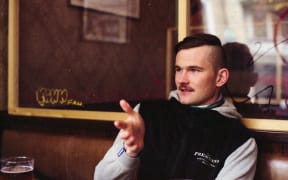Sunday Morning for Sunday 8 May 2022
8:11 What happens if Russia loses in Ukraine?
The outlook for the Ukraine situation is something we want to discuss again with Waikato University's Professor of International Law Dr Al Gillespie, author of the multi-volume The Causes of War.
A number of people have had to interview their keyboards recently when guessing at whether Russian President Valdimir Putin can survive disaster in Ukraine.
Writing in The Conversation this week, Professor Gillespie says the real trigger in Ukraine may not be Russia winning the war, but beginning to lose it. At that point, he warns, "the theory and paper wall of a UN system designed to prevent wider conflict and superpowers clashing may disappear in a flash".
He joins the show to discuss what Russia may do if it loses in Ukraine.
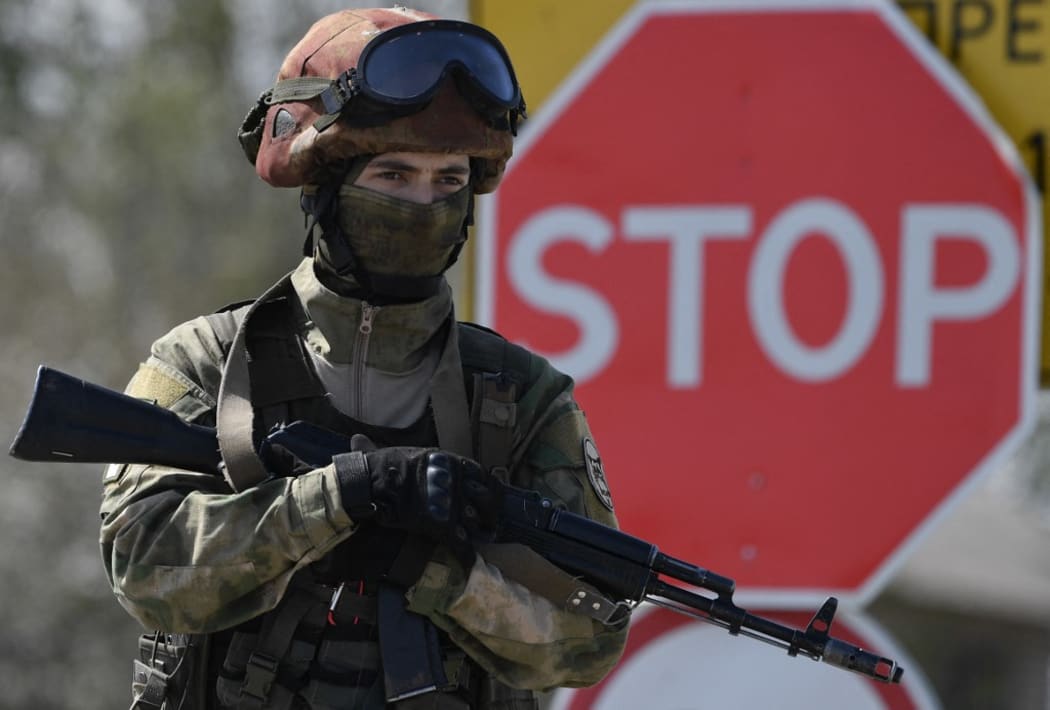
A Russian soldier stands guard at the site of the restoration of the North Crimean Canal in the Kherson region. Photo: AFP
8:21 Aid workers bracing for renewed Russian attacks
There has been no let up in Russia's military offensive against Ukraine since Sunday Morning last spoke to ReliefAid founder Mike Seawright in Kyiv a month ago.
Within Ukraine some 7.7 million people have been internally displaced, with another eight million in urgent need of humanitarian assistance and protection.
Having visited Bucha and Irpin to assess needs and logistical challenges first hand, Seawright's presence on the ground in Ukraine has been pivotal to ReliefAid getting aid where it is needed most.
Support for the organisation continues to flood in back in New Zealand, with this week alone seeing the sale of pizzas in Dunedin, Gingernuts in Taranaki and art in Hawke's Bay, to name a few ReliefAid fundraisers taking place here.
Seawright is back in Ukraine after a short decompression break. And he's expecting things to pick up there again in the coming days, with fears that Russia could use their May 9 Victory Parade to escalate military action.
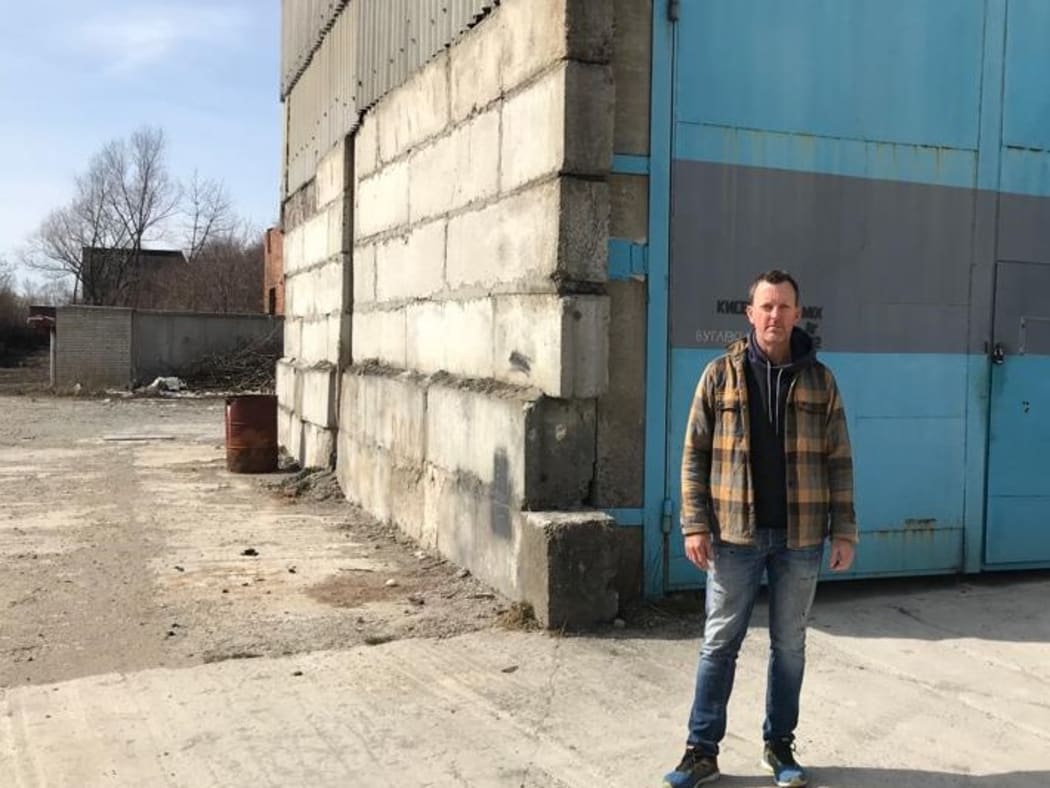
ReliefAid founder Mike Seawright in Kyiv. Photo: Supplied/ReliefAid
8:37 Study shows dog behaviour has little to do with breed
There is no end to the different stereotypes when it comes to dog breeds and perceived behaviour traits - from docile labradors through to flame-snorting Chihuahuas.
However, recent research suggests traits may have less to do with breeds than previously thought.
Dr Elinor Karlsson of the University of Massachusetts Umass Chan medical school is a co-author of a new study published in the journal Science that revealed a huge diversity of behaviours within each breed.
The study analysed survey responses from nearly 20,000 dog owners about their dog's behaviour and sequenced the DNA of over 2000 dogs, including a couple of dogs from this country who have special ties to the researcher.

Photo: 123rf
9:06 Mediawatch
Mediawatch asks if recent reports about an upswing in ram raids and robberies have distorted the truth about youth crime - and how coverage of gang violence echoes a similar panic 25 years ago. Also - the country's most popular TV cop show is back on air in a new format after complaints about racial stereotyping.

Photo: RNZ / Marika Khabazi
9:38 Calling Home: Tjalve Mollison-Sjöberg in Gothenburg
Life in Gothenburg is a world away from Tjalve Mollison-Sjöberg's isolated upbringing on the edge of the Kahurangi National Park.
The Karamea native left New Zealand in 2018 and spent a couple of years working as a chef in Stockholm - one of the rising European food cities - before moving to Gothenburg in September 2020. He is currently in the final throes of completing his masters in Geography at the University of Gothenburg but keeps his hand in as a part-time chef working at a bar in the city.
Tjalve lives with his partner Mathilda, a Gothenburg native, in Johanneberg, one of the city's central suburbs. He's Calling Home this morning.
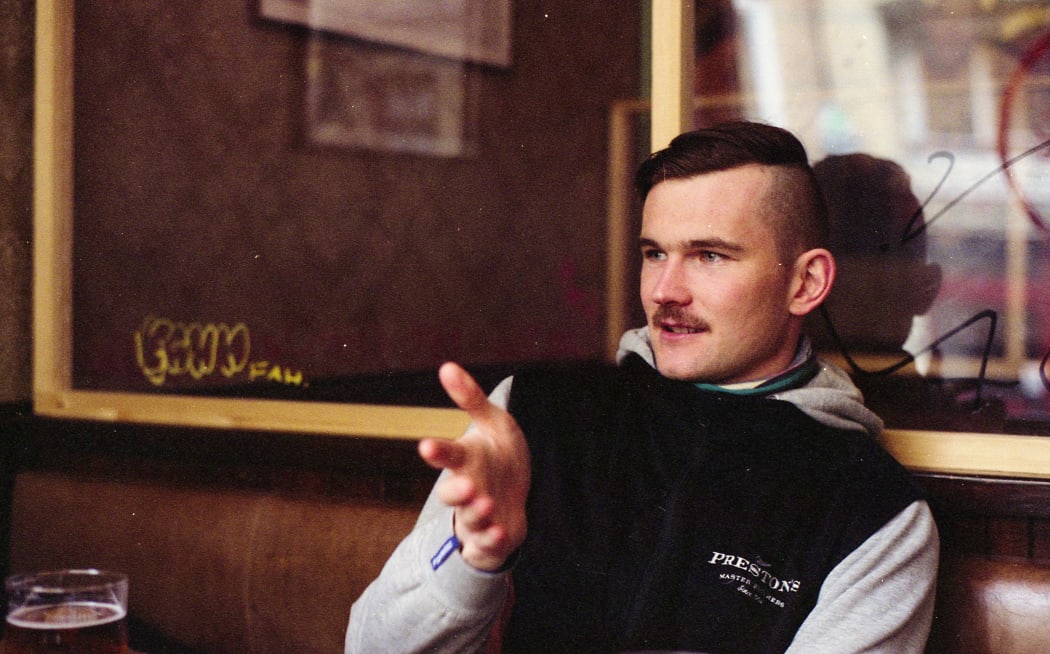
New Zealander Tjalve Mollison-Sjöberg lives in Gothenburg. Photo: Supplied/Olof Sandberg
10:04 Elizabeth Economy: "You never see China step up"
Chinese politics and policy expert Dr Elizabeth C. Economy has been described as one of the most important scholars of China in a generation.
In her new book, The World According to China, Economy details China's role in the world and explains Beijing's ambition to reclaim the country's past glory and sit atop a new international system as the global superpower.
Dr Economy says China wants the rights - without the responsibilities - of global leadership. Along with its patchy human rights record, she points to Beijing's failure to react to the situation in Ukraine as a perfect example of its inability to step up when there is an international crisis.
Dr Economy, who is currently on leave from her position as a senior fellow at the Hoover Institution at Stanford University, joins the show to discuss her new book and the likelihood of Chinese President Xi Jinping's lofty ambitions being realised.
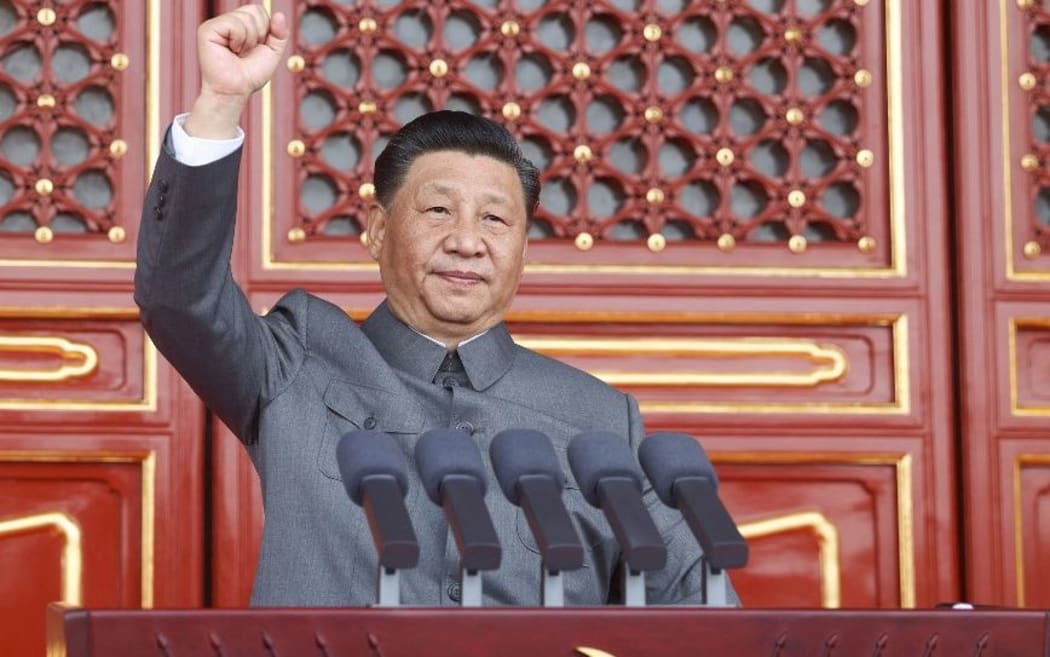
Photo: AFP
10:44 Soul Rebels: reggae on the Ukraine battlefield
There have been plenty of stories about brave Ukrainians taking up arms since the conflict in their country started back in late February.
But the story of the soldiers in the Bob Marley Volunteer Defence Squad is like nothing else.
The group of 10 or so Ukrainians first came together to defend their homeland when Russia annexed Crimea in 2014. Along with a deep love of their country and the late reggae icon - whose image adorns their battle fatigues - the Bob Marley squad share a love of good wine, food, music and, of course, weed. In fact, their motto states, roughly, that if you're stoned you can't be killed.
Group member Dmytro Dubas joins the show from a hospital in Ukraine to discuss the group's unique approach to warfare.
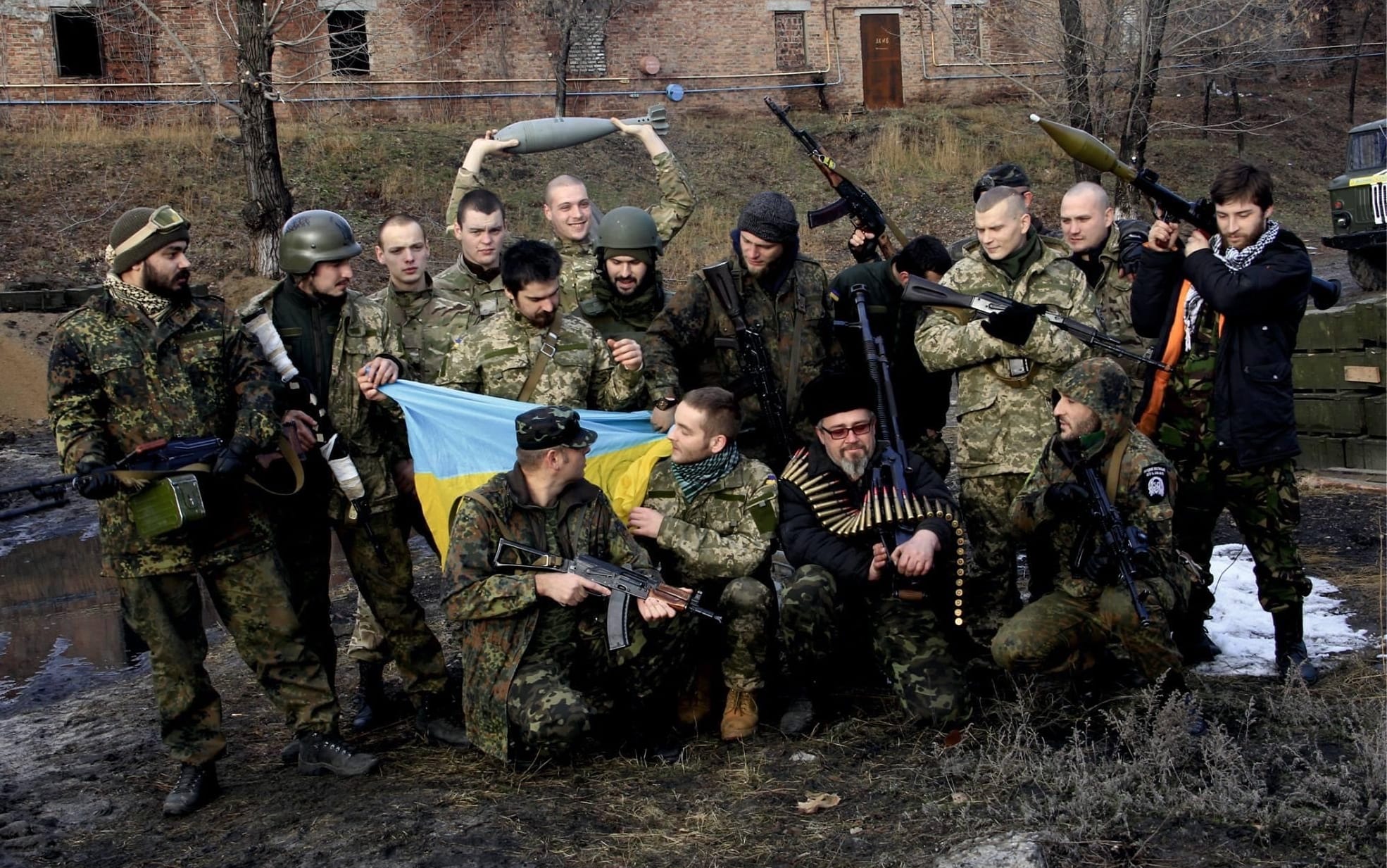
The Bob Marley Volunteer Defence Squad in Ukraine. Photo: Supplied
11:05 Pene Pati: I'm Listening To This
Sol3 Mio star Pene Pati has a lot on this plate at the moment, which is the way we like things on this segment.
Now hitting the end of a season playing Alfredo in La Traviata in Berlin (following stints in Italy, Austria, San Diego and Paris already this year), the Samoan tenor's heading back stateside - this time to Cleveland - to play Cassio in Otello In Concert. Then it's back to France (Aix-en-Provence) for a season of Moïse et Pharaon...
He's missing everyone back home on Mother's Day, especially his own mother, Juliette, to whom he's dedicating his 'I'm Listening To This' selection this morning.
Pene is with us from Berlin to discuss his hectic schedule, making his name in the industry and dying well in opera.
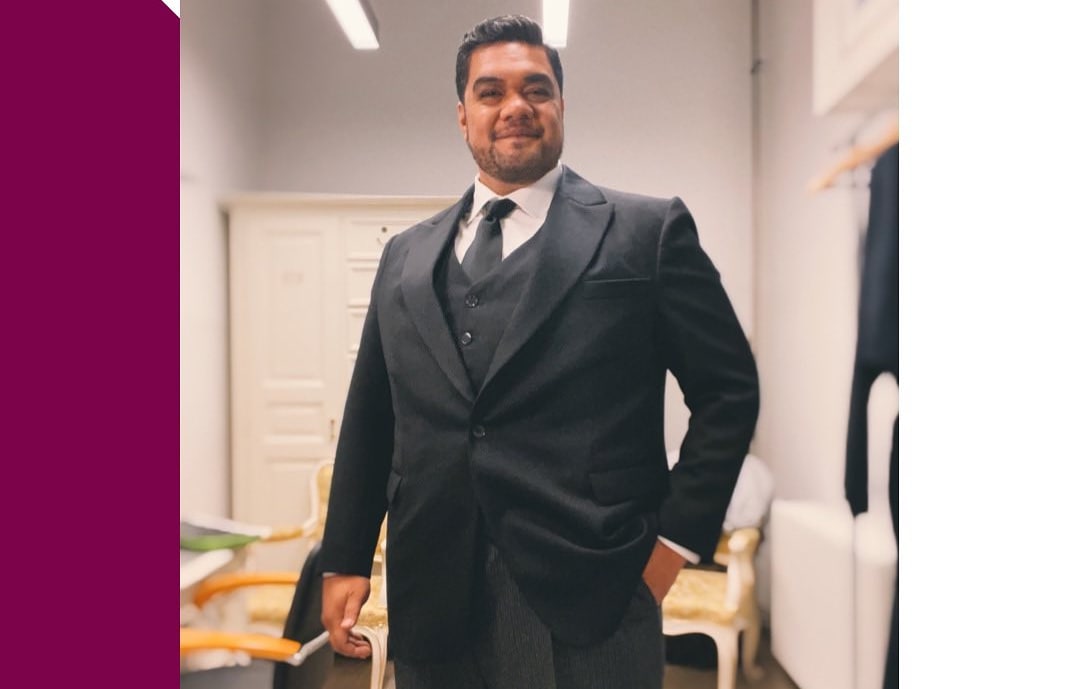
Kiwi tenor Pene Pati in Berlin. Photo: Supplied/Facebook
11:24 Are we already living in the Metaverse?
In 2019, computer scientist and video game pioneer Riz Virk wrote a book called The Simulation Hypothesis, which outlined the 10 stages of technology development that would take us to the Simulation Point, where we won't be able to distinguish our virtual worlds from the physical world.
Virk, who works at Arizona State University's College of Global Futures, came to the conclusion that if our civilisation could reach this point, then some advanced civilisation elsewhere in the universe had probably already done so, and that we are already inside one of their Matrix-like virtual worlds.
He joins the show to discuss the Metaverse and what it's likely to mean for us going forward.
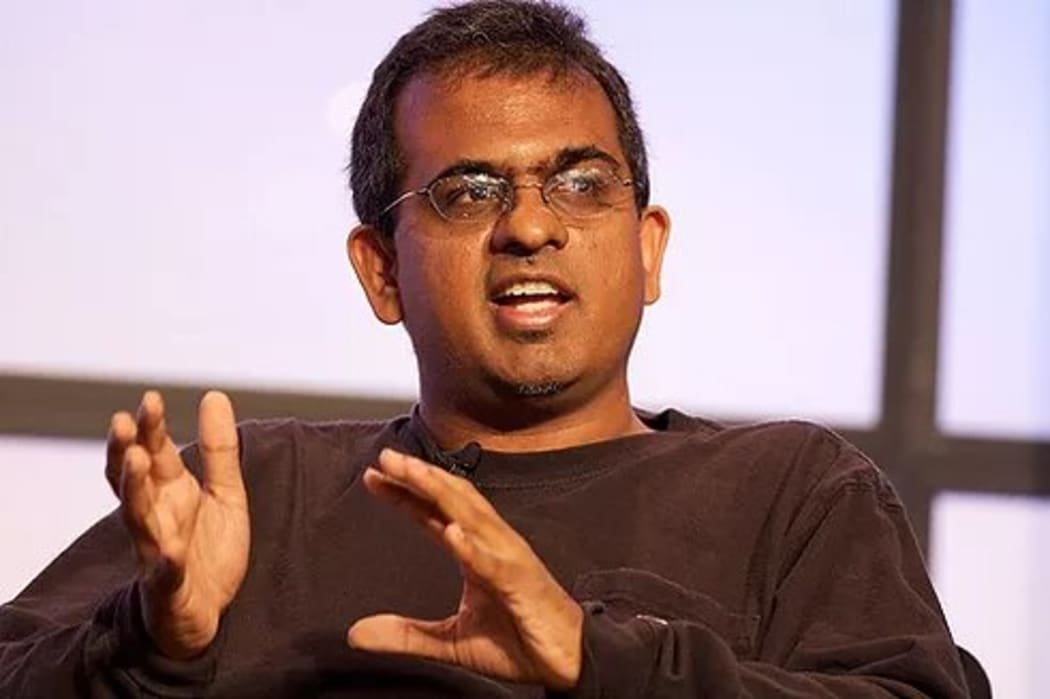
Computer scientist and video game pioneer Riz Virk. Photo: Supplied



